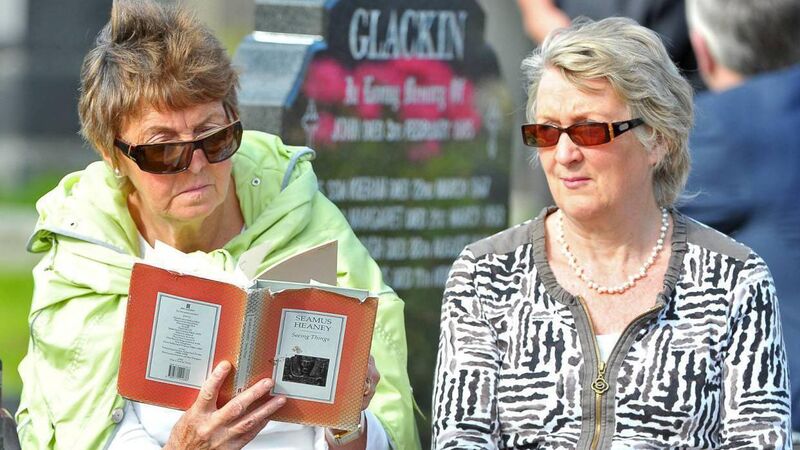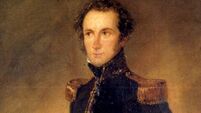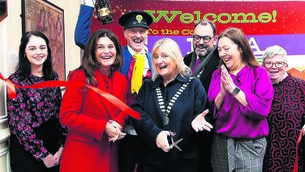John Arnold: Seamus, Paddy and Brendan: Great wordsmiths of our age

Yes, as August came to a close and thousands returned to schools in the autumn of 2013, the great Derry poet died.
He was more than a poet though, he was a thinker as well as a translator and a keen historian.
These last few Sunday mornings, on the wireless in the milking parlour, I’ve heard John Bowman recall aspects of Heaney’s life and work. Thankfully, so much of his work was recorded both for radio and television and remains in perpetuity as a wonderful lasting legacy.
I never met Seamus Heaney, but in poems like Digging I can empathise with his youth in the countryside and the way he viewed his father’s craft of ‘digging’ in parallel with his craft of writing.
Mid-Term Break was for years the most recited poem in the GAA Scór competition all over the country. The tragic consequences of a young life snuffed out in a car accident has still resonance - especially this sad week in Clonmel, where the ‘Sorry for your trouble’ phrase was repeated through many sobs and tearful sighs.
Heaney was a true wordsmith, but he truly admired the craftsmanship of the blacksmith, the wood-turner, the farmer, the basket-maker and the artist.
I’ve oft tried my hand at writing poetry over the years - the words are no problem! Heaney turned words into something else with metre and timing and mystery.
His poem Postscript is stunning, as he describes an everyday scene of a flock of swans; ‘Their feather roughed and ruffling, white on white’ and then ‘You are neither here nor there. A hurry through which known and strange things pass’.
I’ve been to that Flaggy Shore in ‘September or October’, and sitting there as ‘the wind and the light are working off each other’, one can better understand the sheer magic of the Derryman’s literature.
Oh lads, I’d have loved to be at a gathering where Heaney, Brendan Behan and Patrick Kavanagh were holding forth. John Bowman did recall lately how young Heaney - in his 20s - met Kavanagh in a Dublin hostelry a few short months before Patrick died. The Monaghan man had ‘heard’ about Seamus as an up and coming poet but was never a man to heap praise on anyone - he was equally caustic to most ‘strangers’.
Just as Kavanagh crossed the divide between rural Monaghan and flamboyant Dublin, Heaney had a metamorphosis also from his ‘Troubled’ homeland of Ulster to the Garden of Ireland - Wicklow.
Back in 2004, when the centenary of Kavanagh’s birth was marked, Heaney said he came to know the Monaghan poet through words and his writings and was reluctant in one way to actually meet him in the flesh. Kavanagh seemed grumpy and disagreeable, but his poetry is in no way negative or antagonistic.
Talking of shelves, I must tell ye of a book I’ve got lately -t is still on the table and didn’t get to the bookshelf yet! I read Borstal Boy and found it tough-going, to be honest, but obviously it earned worldwide acclaim both as a play and on the small screen.
Though he lived but 41 years, Behan packed a lot into those four decades, including a few terms behind bars - as opposed to a good share of time across from the bar.
In the mid-1950s, he agreed to write a weekly column for The Irish Press newspaper. Between 1954 and 1956, he wrote articles on every imaginable subject from the virtues and vicissitudes of cheese, the Foreign Legion, pantomimes, the best red wine and travel tales.
His gift of interweaving English, Irish and French is amazing. Many of the articles are retelling conversations he had all over the country and all over the world.
The whole collection has now been collated and edited by John Brannigan in A Bit Of A Writer, Brendan Behan’s Short Prose.
I read so much pertaining to his family -his father Stephen and mother Kathleen especially.
Kathleen Kearney - sister of Peadar who wrote Amhrain na bhFiann - was Mrs Behan. The mother of all the Behans lived to be 95.
Just recently, Imelda May played the part of Kathleen in the Olympia in Dublin in a sold-out show. I had hoped to see the play, but what do they say about the best laid plans and all that? Hopefully, it will return to the stage again soon in a less busy time of the year!
While Brendan was probably the best known of Kathleen’s sons, Brian and Dominic were no slouches when it came to penmanship. Brian wrote Mother Of All The Behans and Kathleen amongst other works. Dominic is best known as a songwriter and Liverpool Lou and The Merry Ploughboy - made famous by Dermot O’Brien - are among his compositions.
Brendan truly burnt the candle at both ends and drink probably shortened his life. While he had a public persona of being rough, bawdy and loud he was, behind it all, a wonderful writer.
If I had Brendan, Paddy and Seamus here in the house, I’d have tried to find out what was and is that ‘ingredient’ that makes good into great? Would they answer, would they know - probably not, but ‘twould be worth the asking nevertheless.
There’s a Kavanagh Centre in Inniskeen and when I go there I’ll have to walk through Mucker townland to imbibe the air there ‘On an apple-ripe September morning/ Through the mist-chilled fields I went/With a pitchfork on my shoulder/less for use than for devilment’ (Threshing Morning).
Was it Leo Maguire who wrote that Dublin can be heaven with coffee at eleven , and a stroll through Steven’s Green? But, to my mind, that’s not Behan’s Dublin.
Over the years, I’ve often stayed in Dublin in early September - the Saturday night before the Hurling Final (should be this coming weekend ,ach son sceal eile!) - and very early on the Sunday morning gone out for a long walk.
Going through the empty streets up around Mountjoy Square where the Behans lived, I could imagine him singing The Auld Triangle or some such song! ‘Ah he was a quare one, I tell you’.
Poets and writers fascinate me - and still I gaze and still my wonder grows how Seamus and Paddy and Brendan still weave their wordy spells after all these years.







 App?
App?




